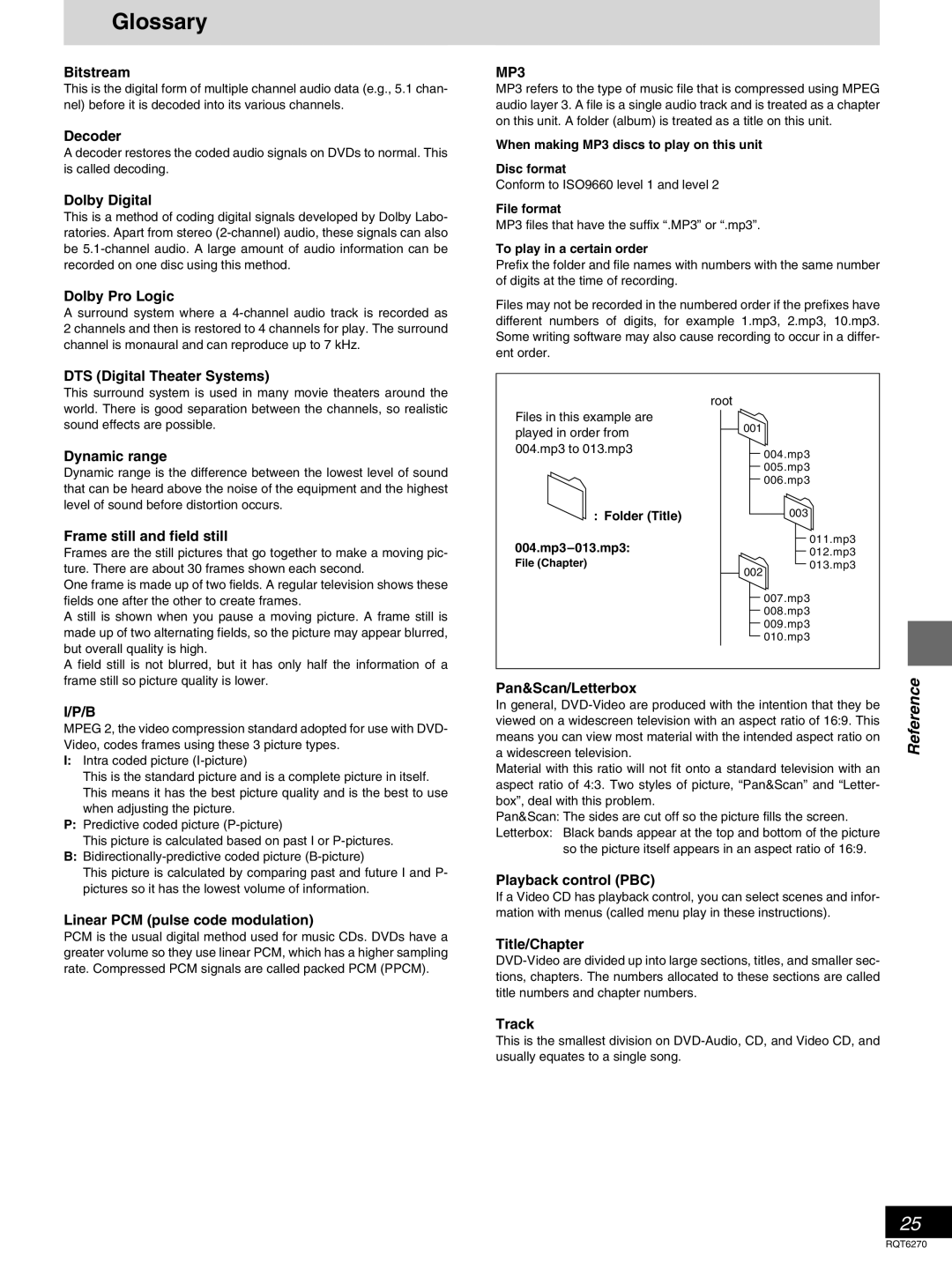
Glossary
Bitstream
This is the digital form of multiple channel audio data (e.g., 5.1 chan- nel) before it is decoded into its various channels.
Decoder
A decoder restores the coded audio signals on DVDs to normal. This is called decoding.
Dolby Digital
This is a method of coding digital signals developed by Dolby Labo- ratories. Apart from stereo
Dolby Pro Logic
A surround system where a
DTS (Digital Theater Systems)
MP3
MP3 refers to the type of music file that is compressed using MPEG audio layer 3. A file is a single audio track and is treated as a chapter on this unit. A folder (album) is treated as a title on this unit.
When making MP3 discs to play on this unit
Disc format
Conform to ISO9660 level 1 and level 2
File format
MP3 files that have the suffix “.MP3” or “.mp3”.
To play in a certain order
Prefix the folder and file names with numbers with the same number of digits at the time of recording.
Files may not be recorded in the numbered order if the prefixes have different numbers of digits, for example 1.mp3, 2.mp3, 10.mp3. Some writing software may also cause recording to occur in a differ- ent order.
This surround system is used in many movie theaters around the world. There is good separation between the channels, so realistic sound effects are possible.
Dynamic range
Dynamic range is the difference between the lowest level of sound that can be heard above the noise of the equipment and the highest level of sound before distortion occurs.
Files in this example are played in order from 004.mp3 to 013.mp3
: Folder (Title)
root
001
004.mp3
005.mp3
006.mp3
003
Frame still and field still
Frames are the still pictures that go together to make a moving pic- ture. There are about 30 frames shown each second.
004.mp3–013.mp3:
File (Chapter)
002
011.mp3
012.mp3
013.mp3
One frame is made up of two fields. A regular television shows these fields one after the other to create frames.
A still is shown when you pause a moving picture. A frame still is made up of two alternating fields, so the picture may appear blurred, but overall quality is high.
A field still is not blurred, but it has only half the information of a frame still so picture quality is lower.
I/P/B
MPEG 2, the video compression standard adopted for use with DVD- Video, codes frames using these 3 picture types.
I:Intra coded picture
This is the standard picture and is a complete picture in itself. This means it has the best picture quality and is the best to use when adjusting the picture.
P:Predictive coded picture
This picture is calculated based on past I or
B:
This picture is calculated by comparing past and future I and P- pictures so it has the lowest volume of information.
Linear PCM (pulse code modulation)
PCM is the usual digital method used for music CDs. DVDs have a greater volume so they use linear PCM, which has a higher sampling rate. Compressed PCM signals are called packed PCM (PPCM).
007.mp3
008.mp3
009.mp3
010.mp3
Pan&Scan/Letterbox
In general,
Material with this ratio will not fit onto a standard television with an aspect ratio of 4:3. Two styles of picture, “Pan&Scan” and “Letter- box”, deal with this problem.
Pan&Scan: The sides are cut off so the picture fills the screen.
Letterbox: Black bands appear at the top and bottom of the picture so the picture itself appears in an aspect ratio of 16:9.
Playback control (PBC)
If a Video CD has playback control, you can select scenes and infor- mation with menus (called menu play in these instructions).
Title/Chapter
Track
This is the smallest division on
Reference
25
RQT6270
